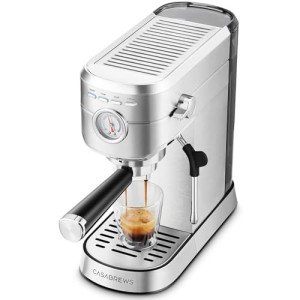Seven Reasons To Explain Why Energy-Efficient Espresso Machines Is Important
Energy-Efficient Espresso Machines: A Comprehensive Guide
Worldwide of coffee lovers, espresso machines are often considered as important devices for developing abundant, aromatic coffee. Nevertheless, the energy intake associated with these machines can cause increased utility costs and environmental issues. As customers end up being more eco-conscious, energy-efficient espresso machines have emerged as a popular choice. This post intends to check out the features, benefits, and choices offered in energy-efficient espresso machines, assisting coffee lovers make informed options.
What Makes an Espresso Machine Energy-Efficient?
Energy-efficient espresso machines are designed to reduce energy intake while keeping optimal performance. Several features add to the energy effectiveness of these machines:
Insulation: High-quality insulation helps keep heat, reducing the energy needed to keep optimum brewing temperature levels.
Smart Technology: Many modern machines are equipped with programmable settings that allow users to arrange brewing times and switch to standby mode when not in use.
Quick Heat-up Time: Energy-efficient espresso machines typically use innovative heating technologies, such as thermoblocks or PID controllers, to heat water quickly.
Low Wattage: Machines that operate at lower wattages consume less energy in general, making them more efficient.
Vehicle Shut-off: Automatic shut-off features ensure that the machine turns off after a certain period of lack of exercise, more lowering energy waste.
Benefits of Energy-Efficient Espresso Machines
Purchasing an energy-efficient espresso machine can offer several benefits:
Cost Savings: Over time, lower energy intake can cause decreased electrical energy expenses.
Environmental Impact: Using less energy lowers carbon footprints, making these machines a more sustainable choice for ecologically mindful consumers.
Improved Performance: Many energy-efficient designs also offer superior developing innovations, leading to better-tasting espresso.
Toughness: Typically, energy-efficient machines are developed with high-quality components, resulting in greater durability.
Features to Consider
When selecting an energy-efficient espresso machine, a number of features need to be taken into consideration:
- Type of Machine: Options consist of manual, semi-automatic, and completely automatic designs, each with differing degrees of user control and automation.
- Brew Quality: Look for machines that utilize high-quality developing systems to ensure ideal taste extraction.
- Upkeep: Some machines have self-cleaning features that can save energy and effort in upkeep.
- Capacity: Depending on individual or household size, machine capability can impact energy usage, with larger machines often requiring more power.
Popular Energy-Efficient Espresso Machines
The marketplace provides a range of energy-efficient espresso machines catering to various requirements and choices. Below are some noteworthy models:
Brand
Model
Key Features
Energy Consumption
Breville
Barista Express
Integrated grinder, PID temperature level control, quick heat-up.
Low
DeLonghi
EC155
Compact size, easy to use, long lasting develop.
Moderate
Rancilio
Silvia
Sturdy style, outstanding temperature stability, and has a low ecological effect.
Moderate
Gaggia
Classic
Trusted manual operation, long lasting brass elements, and effective steaming capability.
Low
Jura
E8
Completely automatic, smart features, and a detachable brew group for easy cleansing.
Low
Tips for Optimal Energy Efficiency
Aside from choosing an energy-efficient design, customers can adopt a number of practices to make the most of energy efficiency:
- Preheat: If your machine has a pre-heating function, use it to guarantee that the optimal temperature level is reached quickly before brewing.
- Turn Off After Use: Always switch off the machine after brewing or utilize machines with car shut-off features.
- Routine Maintenance: Keep the machine well-kept to guarantee it runs effectively and successfully.
FAQs About Energy-Efficient Espresso Machines
1. Are energy-efficient espresso machines more expensive?
While the preliminary financial investment may be higher for energy-efficient designs, the long-term savings on electricity expenses can balance out the initial cost. Furthermore, numerous energy-efficient machines featured sophisticated features that boost the developing experience.
2. How do I understand if an espresso machine is energy-efficient?
Try to find signs such as Energy Star certification, user reviews, and specifications relating to wattage and heat-up time. Machines with specific functions focused on decreasing energy consumption are typically created for better performance.
3. Can I use an energy-efficient espresso machine for other coffee styles?
Lots of energy-efficient espresso machines use versatility, allowing users to brew various coffee styles beyond espresso, such as lattes and coffees, by including steaming capabilities.
4. Do energy-efficient designs compromise quality for effectiveness?
Not necessarily. Coffeee of energy-efficient espresso machines are equipped with high-quality brewing innovation that can improve taste extraction while minimizing energy consumption.
5. What upkeep is required for energy-efficient espresso machines?
Routine upkeep includes cleaning up the machine, descaling when required, and regularly examining seals and gaskets to ensure ideal performance and energy efficiency.
Energy-efficient espresso machines represent a best blend of efficiency, cost savings, and ecological duty. By thinking about different features, benefits, and brand names, customers can select a design that suits their unique preferences while contributing positively to the environment. As the pattern toward sustainable living grows, the popularity of energy-efficient devices, consisting of espresso machines, is most likely to continue its upward trajectory, providing coffee enthusiasts a guilt-free way to enjoy their daily dose of espresso.
